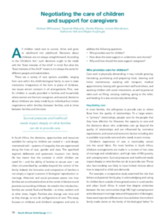Displaying 1 - 10 of 63
The aim of this study was to examine the academic trajectories of children in out-of-home care (OOCH) and whether kinship care has a protective effect relative to nonkin foster care.
This article explores evidence which shows that the use of ‘private family arrangements’ is motivated partly by a concern for subsidiarity, and partly by necessity: they provide a source of placements in cases where regulatory requirements and a lack of resources would otherwise make the placement challenging or impossible.
This paper reports the findings from a small qualitative study into child fosterage undertaken in Namibia in 2019.
There is little empirical evidence on how to improve the well‐being and safety of children in informal kinship care in Ghana. Thus, this study reports findings from in‐depth interviews with 15 young people, 18 to 23 years, from Banda—an ethnic group where informal kinship care is an accepted cultural practice.
This chapter examines the cultural logic of child care in Africa, focusing on one variation of fosterage, okutekula, among the Ova-ambo in Northern Namibia.
The authors of this study conducted a qualitative 2-year study to investigate informal caregivers’ motivations, assets, and needs.
This article explores the extent of previous child welfare involvement and its association with well-being among children in informal kinship care.
This article examines the challenges encountered by, and the opportunities available to, young adults as they transition from informal kinship-based foster care to independent living in the Bikita District of Zimbabwe.
This article investigates the colonialist definitions of the terms “orphan” and “adoption”, contrasting them with how the traditional practice of child circulation in Fiji cared for orphaned children.
This chapter from the South African Child Gauge 2018 focuses on childcare and children’s caregivers in South Africa and aims to address the following questions: Who provides care for children? How does the state support or undermine care choices? Why and how should the state support caregivers?

